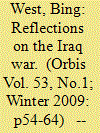|
|
|
Sort Order |
|
|
|
Items / Page
|
|
|
|
|
|
|
| Srl | Item |
| 1 |
ID:
087661


|
|
|
|
|
| Publication |
2009.
|
| Summary/Abstract |
Why a combatant command for Africa? I argue that AFRICOM was formed to implement the U.S. national security strategy that seeks to strengthen states and eliminate ungoverned space, as well as establish relationships with African states that offer a means to greater state stability and foster economic development. In so doing, it counters global jihadist by denying them haven among weak governments or in ungoverned areas. It protects U.S. interests in resources by helping governments become more stable. And it competes with the Chinese approach that could worsen the status quo of ineffective states and ungoverned space. Indeed, the U.S. approach of increasing state effectiveness makes African countries less susceptible to the problems that may arise from the Chinese approach and so serves China's interests in access to natural resources.
|
|
|
|
|
|
|
|
|
|
|
|
|
|
|
|
| 2 |
ID:
087649


|
|
|
|
|
| Publication |
2009.
|
| Summary/Abstract |
The George W. Bush administration embraced a particularly aggressive counter-terrorist and counter-proliferation strategy after the 9/11 terrorist attacks. The "Bush Doctrine," as it became known, reflects a "primacist" approach to grand strategy that aims not only to eliminate global terrorist networks and cowl rogue state proliferators, but also to dissuade potential near-peer competitors from challenging the American-centred international system. Critics expect that this ambitious approach to strategic affairs has become unsustainable in the face of the growing quagmire in Iraq. But "security addiction" in the post-9/11 environment has instead created conditions for a bipartisan consensus on the overall direction, if not the particular modalities, of "primacist" grand strategies. Despite the unpopularity of the Bush administration and significant American commitments to Afghanistan and Iraq, it is highly unlikely that President Barack Obama will heed calls for military retrenchment or strategic restraint.
|
|
|
|
|
|
|
|
|
|
|
|
|
|
|
|
| 3 |
ID:
087650


|
|
|
|
|
| Publication |
2009.
|
| Summary/Abstract |
The dominant narrative concerning the Bush Doctrine maintains that it is a dangerous innovation, an anomaly that violates the principles of sound policy as articulated by the Founders. According to the conventional wisdom, the Bush Doctrine represents the exploitation of the 9/11 terrorist attacks, by a small group of ideologues-the "neoconservatives"-to gain control of national policy and lead the United States into the war in Iraq, a war that should never have been fought. But far from a being a neoconservative innovation, the Bush Doctrine is, in fact, well within the mainstream of U.S. foreign policy and very much in keeping with the vision of America's founding generation and the practice of the statesmen in the Early Republic. The Bush Doctrine is only the latest manifestation of the fact that U.S. national interest has always been concerned with more than simple security.
|
|
|
|
|
|
|
|
|
|
|
|
|
|
|
|
| 4 |
ID:
087653


|
|
|
|
|
| Publication |
2009.
|
| Summary/Abstract |
The next American president will face a daunting list of national security problems, including a serious defense budget crunch. The budget crisis will be deepened by the global financial crisis, a tapering of supplemental funding associated with the wars in Iraq and Afghanistan, and the steady growth of military healthcare and other personnel costs. After six years of rapid defense budget increases, the Pentagon has lost the practice of matching strategy and resources. The next president will need to manage risk among investments in irregular warfare, counterterrorism, balancing new super powers, countering weapons of mass destruction, and traditional warfare. He will also need to begin to build non-military "soft power" capabilities outside of the Pentagon.
|
|
|
|
|
|
|
|
|
|
|
|
|
|
|
|
| 5 |
ID:
087656


|
|
|
|
|
| Publication |
2009.
|
| Summary/Abstract |
Indonesia, the world's fourth largest country, third largest democracy and home to the world's largest community of Muslims, has returned to the international stage. Indonesia's membership in a number of important global communities-it resides physically in Asia but is part of the broader Muslim world, the developing world, and the community of democracies-makes it an important international actor. Many Americans assume that common democratic values will translate into shared foreign policy goals and cooperation between the United States and Indonesia. The two countries do share significant interests, such as counter terrorism, maritime security, and a wariness of China, but also hold starkly different positions on the Middle East peace process and global trade issues. Democracy provides opportunities for the two-thirds of Indonesians who hold anti-American views to influence foreign policy, making it costly for Indonesian leaders to cooperate with the United States. Indonesia's return is good news for America, but the relationship needs to be managed skillfully to maximize benefits for both sides.
|
|
|
|
|
|
|
|
|
|
|
|
|
|
|
|
| 6 |
ID:
087659


|
|
|
|
|
| Publication |
2009.
|
| Summary/Abstract |
Information has emerged as a critical-potentially the decisive-front in both the global war with violent radical Islam and the overlapping but so far largely unadmitted Cold War with nonviolent radical Islam. In fact, the information front is undoubtedly the closest thing that al Qaeda has to a strategic center of gravity. Unfortunately, America faces an extremely hostile information environment in the Middle East and al Qaeda has proven far more effective at getting its message across than has the United States. A more effective U.S. information strategy would be one that stresses three themes: a democratic critique of radical Islam; an Islamic critique of radical Islam; and a critique of the crisis in Middle Eastern civilization. While these will not necessarily make the U.S. or its policies more popular, they may drive a wedge between radical Islam and potential supporters.
|
|
|
|
|
|
|
|
|
|
|
|
|
|
|
|
| 7 |
ID:
087662


|
|
|
|
|
| Publication |
2009.
|
| Summary/Abstract |
One of the most formidable challenges of this new century concerns the realm of identity. Across the globe, personal identity remains our most valuable asset. Today, more than ever before, unscrupulous and dangerous individuals driven by a variety of motives are attempting to steal the identities of others, conceal their own identities and create new and fraudulent identities.
|
|
|
|
|
|
|
|
|
|
|
|
|
|
|
|
| 8 |
ID:
087654


|
|
|
|
|
| Publication |
2009.
|
| Summary/Abstract |
Our foreign policy elites, the press, our elected representatives and the general public internalize "lessons" from each war, although the lessons may be wrong or misapplied. How we arrive at such consensus lessons is a mystery. It is too early to predict what lessons from Iraq will guide future U.S. decision-making. But on the situation as it now stands, it is possible to make some broad generalizations concerning what went right in Iraq and what went wrong.
|
|
|
|
|
|
|
|
|
|
|
|
|
|
|
|
| 9 |
ID:
087657


|
|
|
|
|
| Publication |
2009.
|
| Summary/Abstract |
As the Bush presidency draws to a close, the foreign policy community is taking stock of contemporary U.S.-Northeast Asian relations, assessing the challenges and opportunities that are likely to confront the next administration. China presents both in abundance, as reflected in ongoing tensions and misunderstandings in the Sino-American bilateral relationship. This article assesses the prospects for Washington to improve its relations with China through the mechanism of "track two" diplomacy. First, we expand on the track two concept by examining its main components and functions with illustrative examples. We extend the existing conceptualization of track two beyond its traditional conflict resolution functions and develop an account of it as a mechanism for policy coordination and the reorientation of regional dynamics from conflict to cooperation. Second, we identify major areas of U.S. interest in Northeast Asia and show how track two diplomacy might usefully be pursued within these contexts. Our analysis culminates with recommendations on how the Unites States should apply track two strategies in its relations with China.
|
|
|
|
|
|
|
|
|
|
|
|
|
|
|
|
|
|
|
|
|